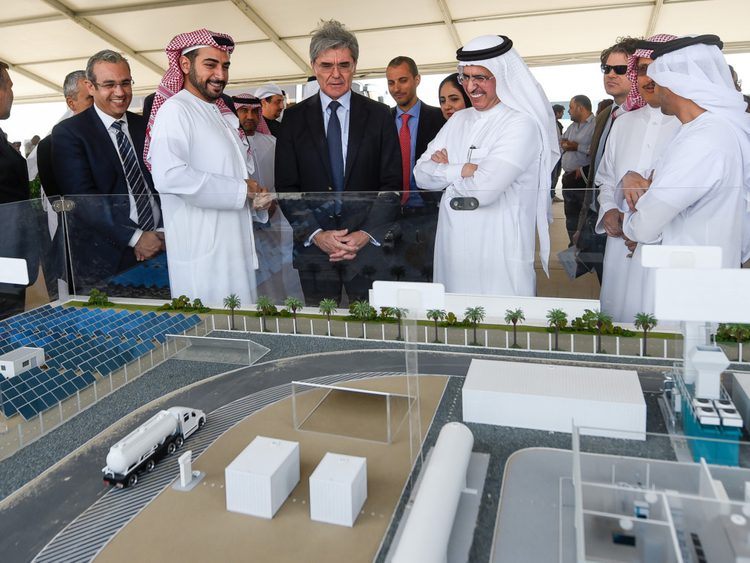On January 18, 2023, the first edition of the UAE Green Hydrogen Summit was held as part of Abu Dhabi Sustainability Week themed: ‘The Road to Net Zero: The UAE’s Vision to Become a Global Hub for the Green Hydrogen Economy’.
“We are looking forward to developing a green hydrogen economy in the Middle East because this type of energy is the best solution to the climate crisis,” said Sherif Al-Olama, Undersecretary of the UAE Ministry of Energy, explaining the UAE government’s plan to establish a major control center for the green hydrogen economy.
Details of the matter were presented to all participants during the inaugural Green Hydrogen Summit, hosted by the Abu Dhabi Future Energy Company (Masdar), to announce that the UAE aims to lead the future of green hydrogen in the world, through partnerships with major international institutions, and attracting various investments in this field.
“Sherif” believes that reaching this goal requires the participation of the private sector in facilitating all the possibilities needed by green hydrogen projects, including the provision of simple mechanisms for transportation and storage based on modern technology in infrastructure development, which will make the cost lower than before.
First Green Hydrogen Innovation Center
The summit witnessed the launch of the first-of-its-kind Green Hydrogen Innovation Center, in partnership between Saudi Arabia and the UAE, which plays an important role in providing rapid innovative solutions in this sector in the Middle East and globally, and its mission includes combining the key technologies needed to produce, transport, store and use green hydrogen.
It was found that the center includes a number of specialists from different countries (the United States, the United Kingdom, Australia, and South Africa), who are working to present the appropriate ways to finance green hydrogen projects and produce it in the best possible way, and to provide all possible consultations in this regard.
The aim of the center was to develop some key sectors such as energy consumption in buildings, overcoming the carbon emissions crisis from industrial production processes, as well as technologies for converting waste into hydrogen and then into ammonia.
“Alai Power”, one of the pioneers of the Green Hydrogen Center, is expected to provide hydrogen fuel cell technology platforms in the UAE and Saudi Arabia markets in early 2024.
Alfred Walt, CEO of “Alai Power”, pointed to the objectives of signing these partnerships between Saudi Arabia and the UAE in order to improve infrastructure by providing it with hydrogen fuel cell power, which in turn generates electricity from steam turbines that react a mixture of aluminum and sodium to release heat and hydrogen at the same time without producing carbon dioxide.
Dream of the future
Suhail bin Mohammed Al Mazrouei, Minister of Energy and Infrastructure, was one of the speakers at the summit, who stressed that the UAE has the natural and technological resources that help it develop the process of producing green hydrogen, and exploit it well to obtain clean and renewable energy.
He also noted the development of the strategy adopted by the UAE in cooperation with international institutions, which aimed to acquire 25% of the global hydrogen market share by 2050, in order to produce clean hydrogen and reduce carbon emissions.
“It may seem difficult to some, but the UAE has valuable opportunities in developing the green hydrogen economy and the global energy market in general, “Al Mazrouei” concluded at the Green Hydrogen Summit.
Green Hydrogen Challenges
Jawad Kharaaz, Executive Director of the Regional Center for Renewable Energy and Energy Efficiency (RCREEE) and one of the attendees of the Abu Dhabi Sustainability Week summit, explains in an exclusive interview with “The Middle East Beat” the challenges facing the green hydrogen economy, including the heavy reliance on renewable energies and water to accelerate the energy transition, and investing in huge production capacity from renewable energy, so that the electrical transformers responsible for producing green hydrogen are put into operation, which makes it very expensive.
“Al-Kharraz” also refers to the water challenge, as the Middle East suffers from water scarcity, and in order to produce one kilo of green hydrogen, we need about 10 liters of clean water, but from a technical point of view, desalination is enough to solve this problem, and this is indeed what Arab countries have tended to implement in the past years.
He also explains that the other challenge is that green hydrogen technology is not mature enough internationally, so we hope that the new center will be a source of use of technology in green hydrogen innovations, as the UAE is a leader in the Arab region on the transition to a green hydrogen economy, and less carbon hydrogen.
In conclusion, “Al-Kharraz” stressed that the UAE has huge resources that will help produce green hydrogen in the Middle East, in addition to the legislative facilities provided by the Abu Dhabi government, and the partnerships signed by the government with international institutions in order to reach innovative solutions that help provide green hydrogen at a lower cost and higher productivity.
Image Credit: Ahmed Ramzan/Gulf News



















